In today's business landscape, fostering ethical relationships with vendors is more crucial than ever. Establishing a vendor ethical conduct agreement not only sets clear expectations but also ensures that all parties are committed to upholding integrity and transparency. This collaborative approach helps build trust and enhances brand reputation across the board. Ready to dive deeper into crafting your own agreement? Keep reading!
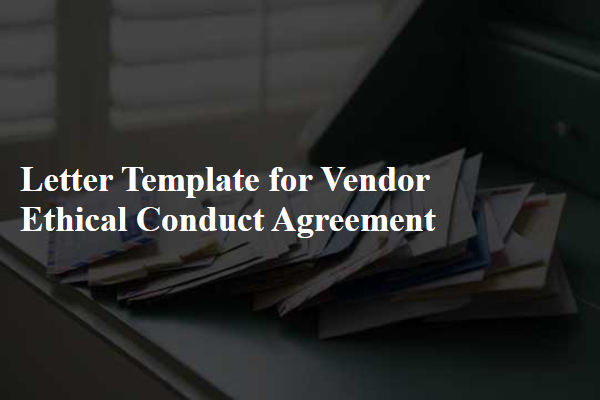
Vendor Code of Conduct
The Vendor Code of Conduct outlines the ethical standards expected from suppliers and vendors in business operations. This document emphasizes compliance with applicable laws and regulations, ensuring labor practices align with internationally recognized human rights standards. Suppliers must commit to fair treatment of workers, free from discrimination, harassment, and unsafe working conditions, particularly in high-risk industries such as textiles and electronics. Environmentally sustainable practices are encouraged, reducing carbon footprints and minimizing waste in manufacturing processes. Moreover, vendors must ensure transparency in their supply chains, maintaining integrity in dealings with clients and stakeholders. Adherence to these guidelines is critical for fostering trust and accountability in business relationships, contributing to a sustainable and ethical marketplace.
Compliance with Laws and Regulations
Vendors must adhere to all applicable laws and regulations as stipulated by governing bodies, including state and federal authorities, such as the U.S. Department of Justice or the Equal Employment Opportunity Commission. These regulations encompass a wide range of areas including labor laws, environmental regulations, and anti-corruption statutes. Violations of these laws can result in severe penalties, including fines and legal action that could jeopardize business operations. Ethical conduct includes understanding local laws specific to the industry, such as the Fair Labor Standards Act for wage and hour regulations, and complying with environmental guidelines set by the Environmental Protection Agency. Additionally, vendors should maintain transparency in their operations and reporting practices to foster trust and accountability. Regular training on legal compliance and ethical standards is essential to ensure ongoing adherence to these obligations.
Anti-Corruption and Anti-Bribery
The Vendor Ethical Conduct Agreement outlines essential principles regarding anti-corruption and anti-bribery measures for all contractual relationships with vendors. Compliance with the Foreign Corrupt Practices Act (FCPA) of 1977 mandates prohibitions against giving, offering, or receiving bribes within public or private sectors. Both direct and indirect payments must align with applicable laws, including the UK Bribery Act 2010, to ensure transparency. Vendors must establish robust internal controls and policies to prevent misconduct, fostering an ethical environment that aligns with the corporate culture of the organization. Regular training programs on ethical practices, along with thorough auditing procedures, are required to maintain accountability and mitigate risks associated with unethical behavior. Breach of these contractual obligations may lead to penalties, contract termination, or legal actions, emphasizing the organization's commitment to integrity and ethical business practices.
Environmental Sustainability Practices
Crafting an effective vendor ethical conduct agreement focused on environmental sustainability practices requires a thorough understanding of pertinent environmental standards and regulations. Vendors are encouraged to comply with local, national, and international environmental laws (such as the Environmental Protection Agency regulations in the United States). Sustainable practices may include waste reduction measures, recycling initiatives, and utilization of renewable energy sources (solar, wind) in operations. Furthermore, vendors should adopt sustainable sourcing policies (like using recycled materials) and ensure proper disposal of hazardous waste (following guidelines set by the Resource Conservation and Recovery Act). Commitment to reducing carbon footprint through operational efficiency (measured by metrics such as energy consumption) will be pivotal. Ensuring transparency in reporting environmental impact (based on metrics like emissions data) promotes accountability and continuous improvement in sustainability efforts. Regular audits (quarterly or annually) will be necessary to assess compliance and identify areas for enhancement in sustainability practices.
Confidentiality and Data Protection
A vendor ethical conduct agreement pertaining to confidentiality and data protection outlines vital responsibilities essential for maintaining information integrity and trust. Vendors must adhere to stringent standards regarding personal data handling, as stipulated by regulations like the General Data Protection Regulation (GDPR), effective since May 2018 in the European Union, ensuring the protection of individuals' privacy rights. Confidential information, potentially including trade secrets, financial records, and customer data, must remain secure and only accessed by authorized personnel. Regular audits and compliance checks may be necessary, ensuring adherence to the terms of the agreement. Failure to comply with these guidelines can result in significant penalties, including legal repercussions and loss of business relationships. Organizations also often impose safeguards such as encryption or secure storage protocols to mitigate potential data breaches.
Letter Template For Vendor Ethical Conduct Agreement Samples
Letter template of Vendor Ethical Conduct Agreement for Sustainable Practices
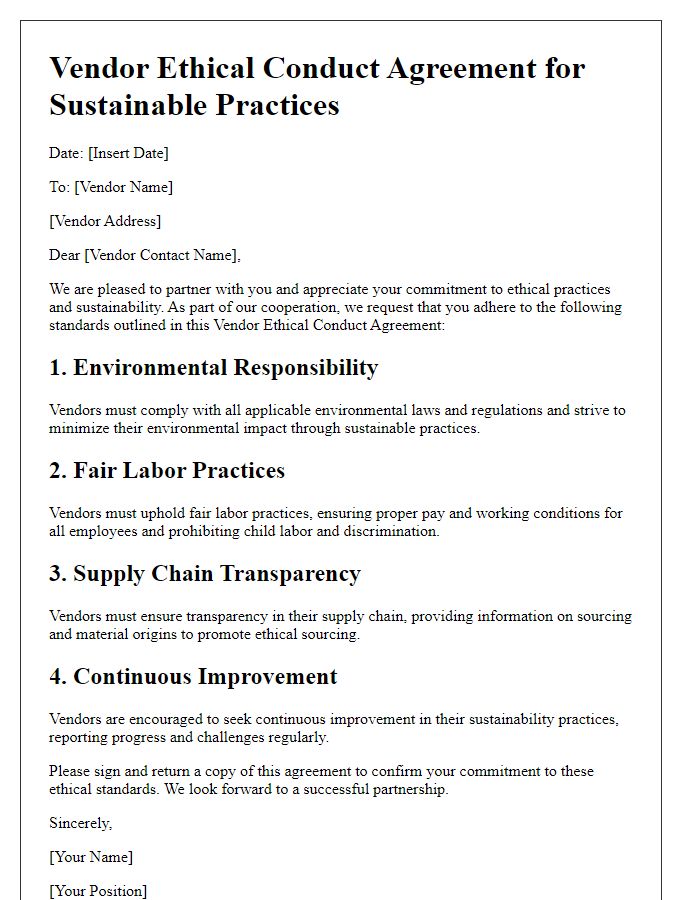
Letter template of Vendor Ethical Conduct Agreement for Compliance Standards
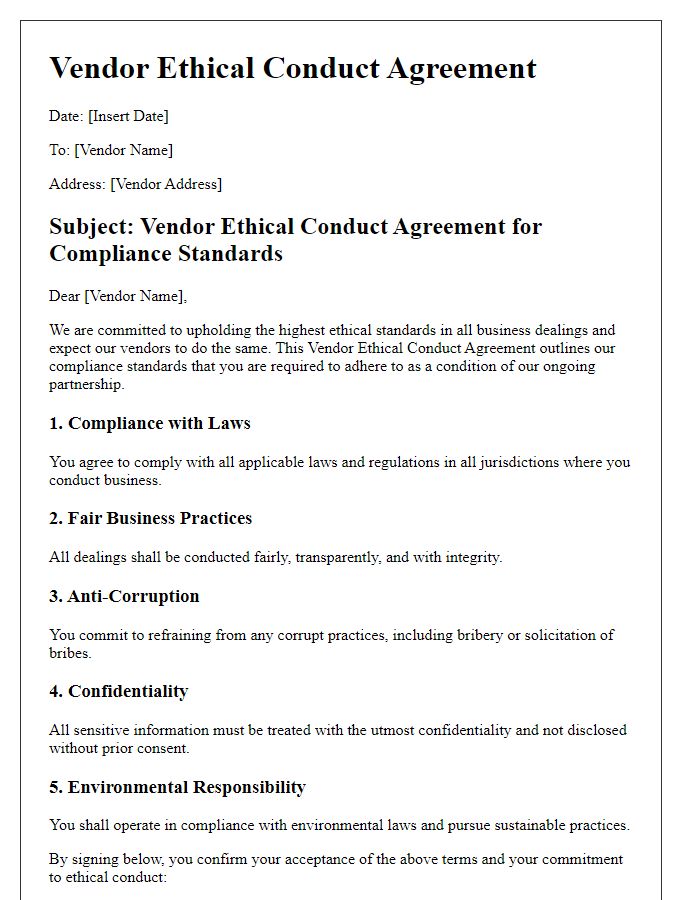
Letter template of Vendor Ethical Conduct Agreement for Fair Labor Practices
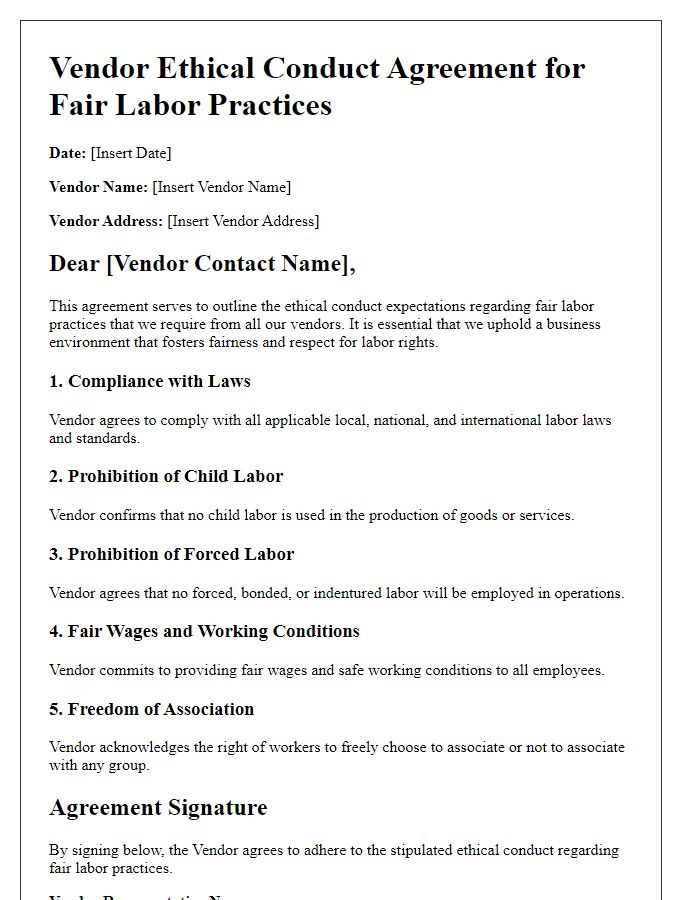
Letter template of Vendor Ethical Conduct Agreement for Environmental Responsibility
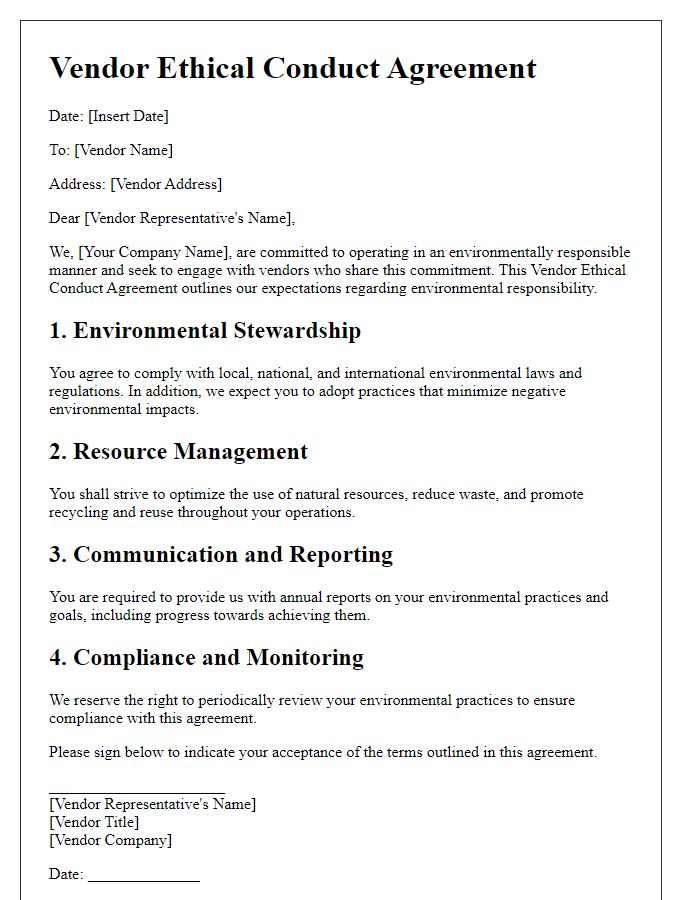
Letter template of Vendor Ethical Conduct Agreement for Anti-Corruption Policies
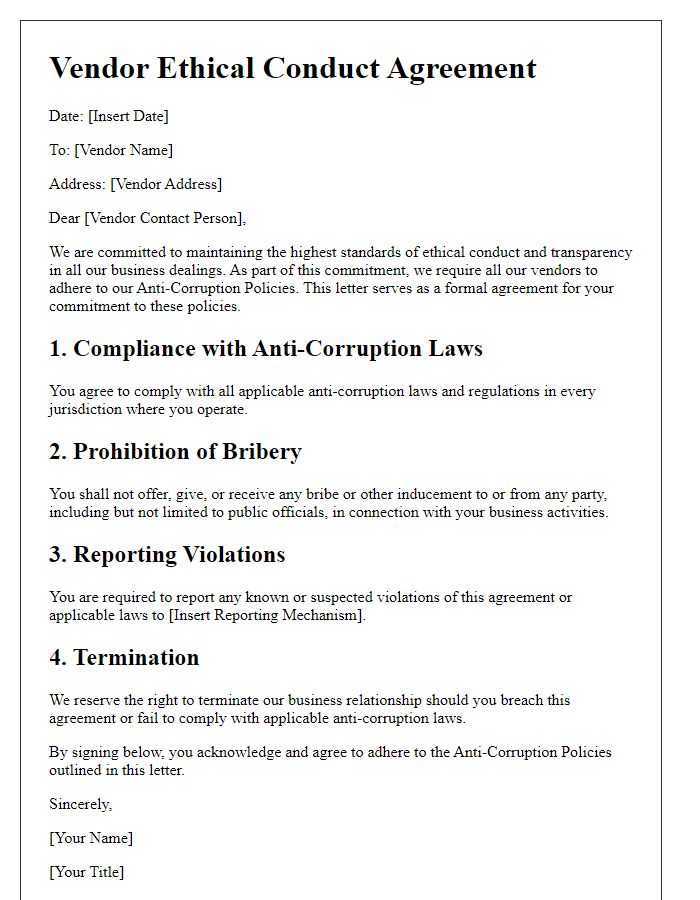
Letter template of Vendor Ethical Conduct Agreement for Transparency and Reporting
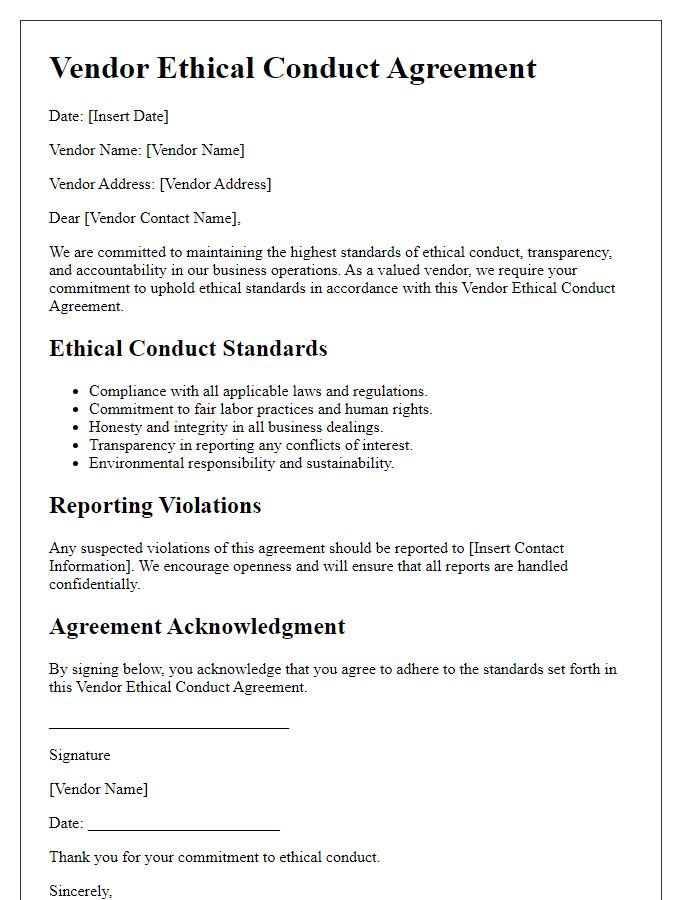
Letter template of Vendor Ethical Conduct Agreement for Community Engagement
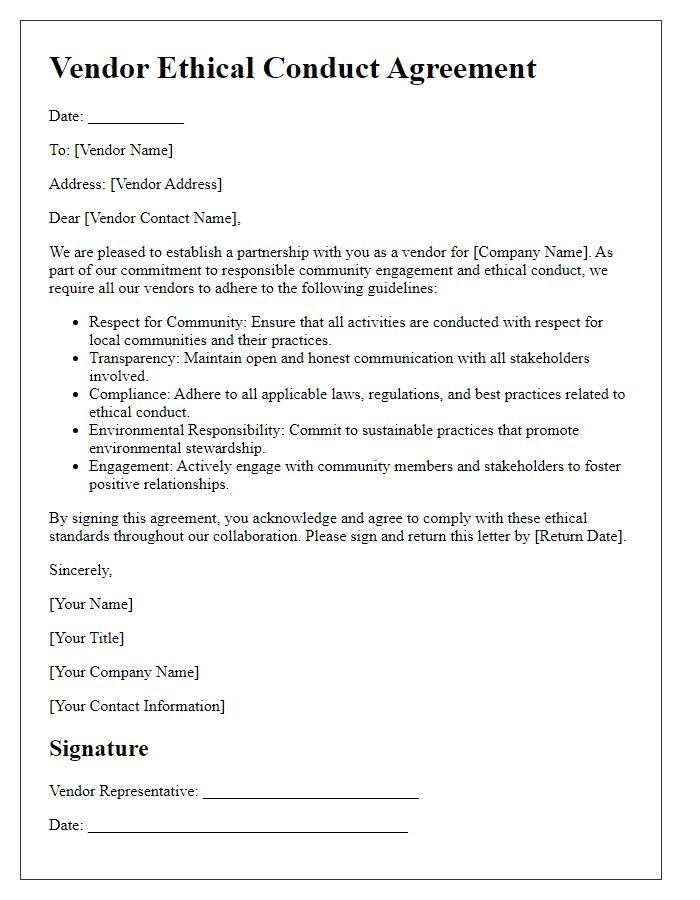
Letter template of Vendor Ethical Conduct Agreement for Supply Chain Accountability
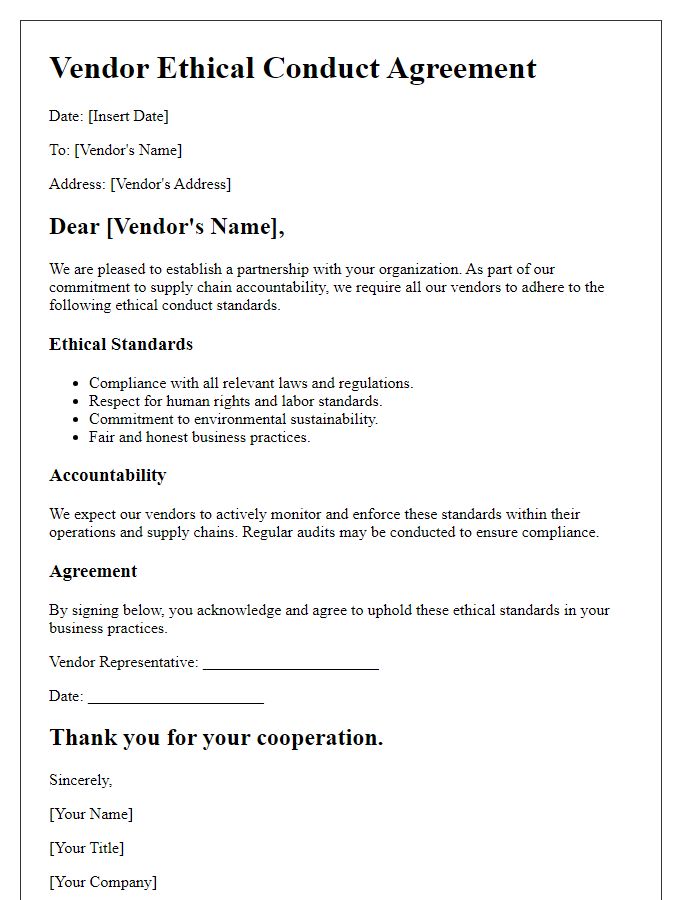
Letter template of Vendor Ethical Conduct Agreement for Diversity and Inclusion
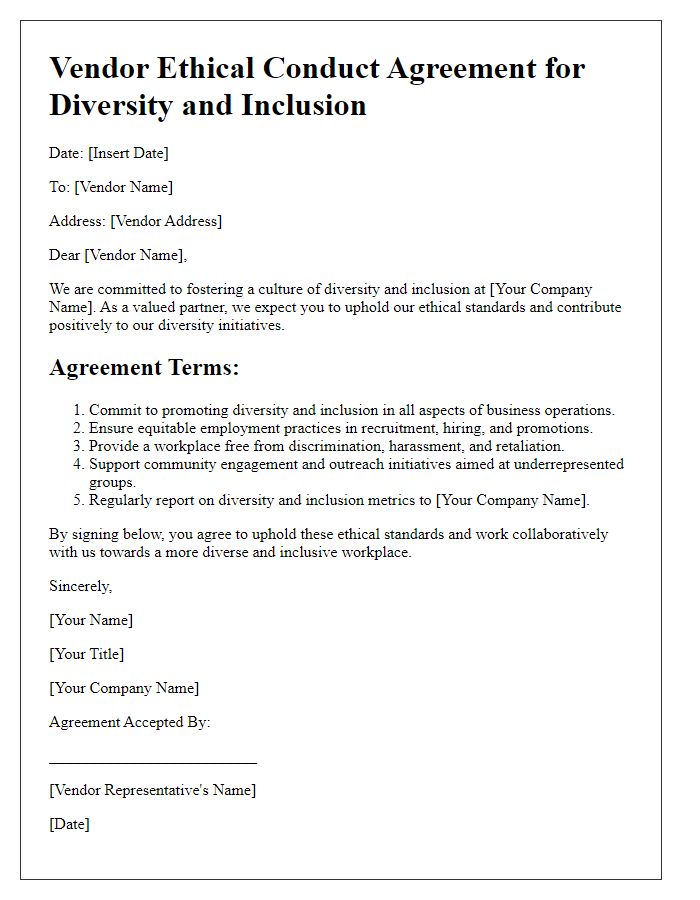

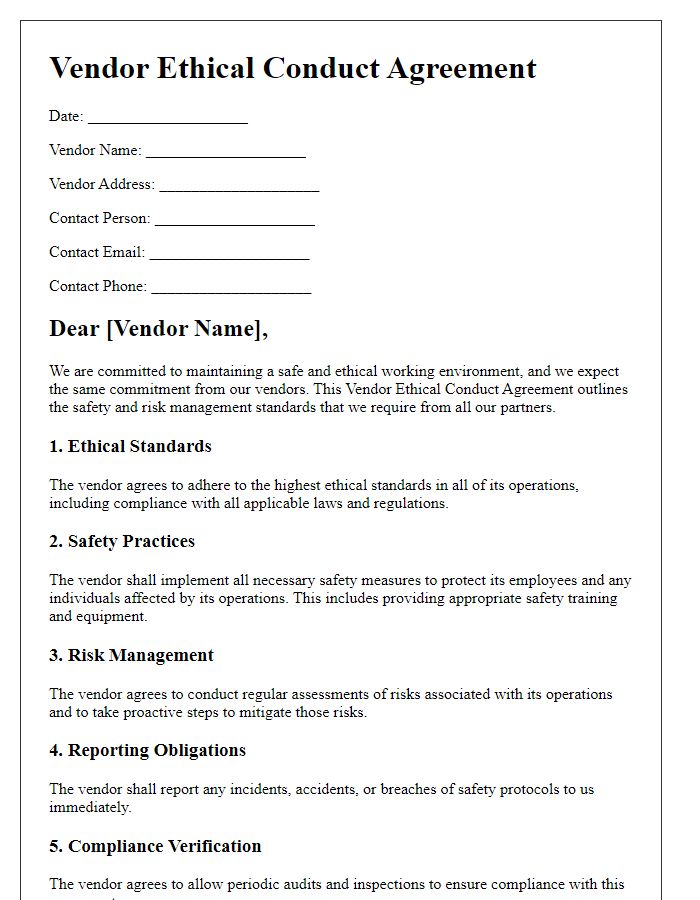


Comments